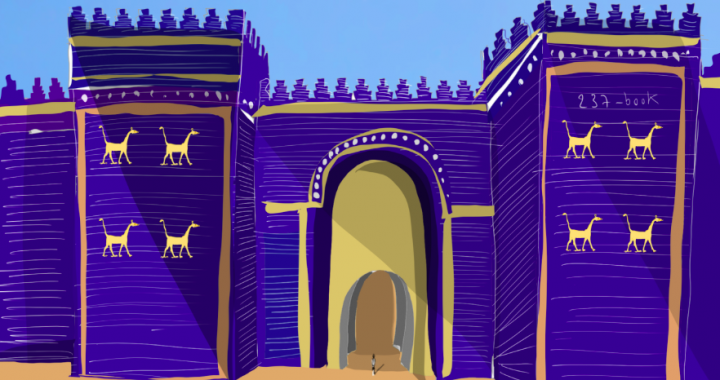Malkah doesn’t walk around saying it, but she thinks we might be the closest thing to Babylonian there is these days. It’s not just pride in the accomplishments of our sojourn over there by the twin rivers. And sure, we still call it ‘exile.’ Captivity. And yes, ‘Babylon’ represents for us the sacking of Jerusalem (though not all of them), and a major brain drain headed east. It was pretty much the peasants who remained, as peasants generally do—glued to the land—’am ha-aretz—holding the fort, so to speak. But without the fort.
Mesopotamia influences Malkah in ways that Egypt never did. She can feel the twin rivers in her bones. While the Nile just makes her want to run.
Malkah feels at home with the Babylonian calendar, for example. While Egypt has five different calendars all moving at different rates, and sometimes it seems in different directions.
She weeps in the month of Tammuz when Ishtar wept for Tammuz, her lover. She doubles up the month of Adar in leap year just as the Babylonians did. She believes, as the ancients did, that there are auspicious and inauspicious months, internal and external both.
The chaos of the Mesopotamian ecosystem just feels more like home than the orderly Egyptian one. Tohu va-vohu. The ‘tohu’ being Tiamat, Marduk’s mother, the inattentive chaos he destroyed to rule both Nature and the gods.
He was the ultimate Law and Order candidate.
I blame Abraham, of course. Malkah’s got him deep in her bones too. There it is, where lineage and ecology are all bound up together. Rootedness. Uprootedness. Inextricable.
Saddam Hussein used the ancients of the twin rivers to mold the Iraqi people into a single national People. Whatever else he did, this was, I think, brilliant. And the rebuilding of Babylon was to be the symbol of unity. Saddam wanted to establish the Neo-Neo-Babylonian Empire. And the only thing stopping him … oh… that would be us. The West. Again.
He reenvisioned ‘Babylon’ extending well past Jerusalem. Though maybe not quite to the Nile.
“After all,” he said, “Abraham was Iraqi—so all the land that God gave to Ibrahim belongs of course to us.” He was obsessed with redrawing the map. Both west, and south at the Gulf. And it was that direction that took priority.
We destroyed a very grand dream, didn’t we? But in the process, we didn’t put anything else there in its place. No god to head the Assembly of Gods. No ruler to keep the twin rivers flowing.
Saddam modeled himself on the ancient god, Marduk. Brutally efficient. Got the job done. The other gods then handed him rule over the entire Assembly of Gods. And washed their hands of messy democracy. Too much trouble.
He created human beings as servants to the gods to clean things up and worship them. Build them a city. Babylon, and the Hanging Gardens, and the Temple of Ishtar were the result.
There was also the matter of the Tower of Babylon. Which Saddam was set on rebuilding. He just wanted to be sure he ‘got it right’ in terms of what it really looked like and where exactly to put it in the reconstruction of Babylon. He was almost there when the (first) Gulf War blew into town. The gods were not amused.
We privilege, don’t we, the Bavli Talmud over the Yerushalmi. It seems more cosmopolitan—with tales of the travels of the rabbis back and forth between Mesopotamian and Jerusalem. Nothing like a good buddy road trip to make a precept sink in. Yerushalmi? Boring. Malkah’s a little unclear on this, being more archaeologist and not at all talmudic scholar. But that’s what her Father says.
Malkah’s favorite tale in the bible is that of Esther and Mordechai—a thoroughly Mesopotamian tale. ‘Hadassah, who was Esther to her People,’ I mean, there they are right there: Ishtar and Marduk, and a story of the evil gods trying to take down the system. We just updated the tale and made it our own.
The past is always present, Malkah’s Father used to say. Always, always now. Apparently that was what Saddam thought as well.
And so. Malkah made it to Babylon while Saddam was still rebuilding. She made it to the Temple of Ishtar. And to the spot where Saddam planned to put the Tower. The Tower that would usher in the Neo-Neo Empire.
But no. She didn’t make it quite to Ur despite appealing to the authorities. It seems Saddam had cleverly turned Ur into an off-limits military zone, and parked his fighter jets all around the Ziggurat. If we bombed Saddam’s Air Force, we would bomb the sacred homeland of Abraham himself.
And Malkah just can’t help it.
She longs for the twin rivers, she cries out for Tammuz, she lights a candle for Ishtar, she wonders whether Marduk’s brutality was better than the bloodshed and chaos without him. She wants to climb the Ziggurat of Ur, and walk the lanes between the ancient ruins. She wants to buy a souvenir Moon God Sīn from Terach’s little shop from the boy selling there for his Father… the boy who looks an awful lot like her. ‘She wants, as always, to put the broken pieces together.
mira z amiras

